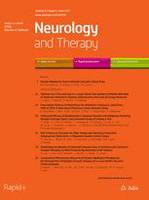
Journal of Pediatric Epilepsy
Scope & Guideline
Empowering clinicians with cutting-edge insights into pediatric epilepsy.
Introduction
Aims and Scopes
- Pediatric Epilepsy Syndromes:
The journal emphasizes the classification, diagnosis, and treatment of various pediatric epilepsy syndromes, including self-limited syndromes and genetic epilepsies. - Clinical Case Studies:
It publishes detailed case reports that provide insights into rare or atypical presentations of pediatric epilepsy, contributing to the clinical knowledge and experience in managing such cases. - Neurophysiological Assessments:
The use of electroencephalography (EEG) and other neurophysiological techniques is a core focus, highlighting their role in diagnosing and managing epilepsy in children. - Treatment Efficacy and Safety:
Research on the efficacy and safety of various antiepileptic drugs and treatment modalities, including surgical interventions, is a significant area of interest. - Multidisciplinary Approaches:
The journal supports the integration of various disciplines such as neurology, psychology, and neuropsychopharmacology to provide comprehensive care and treatment strategies for pediatric patients. - Quality of Life and Family Impact:
Research addressing the psychosocial aspects of pediatric epilepsy, including parental concerns and quality of life assessments, is also a priority.
Trending and Emerging
- Genetic Epilepsies:
An increasing number of studies are focusing on genetic etiologies of epilepsy, reflecting advances in genetic testing and understanding of epilepsy syndromes. - Minimally Invasive Surgical Techniques:
There is a growing emphasis on minimally invasive approaches to epilepsy surgery, as evidenced by multiple studies on techniques like stereoelectroencephalography, indicating a shift towards less invasive treatment options. - Impact of COVID-19 on Epilepsy Management:
Research examining the implications of the COVID-19 pandemic on epilepsy treatment and care has increased, highlighting the need for adaptations in clinical practice during health crises. - Neuropsychological Aspects:
Emerging studies are increasingly addressing the neuropsychological impacts of epilepsy on children, including anxiety, depression, and overall psychological well-being. - Quality Improvement Initiatives:
The journal is witnessing a trend towards quality improvement studies aimed at enhancing care protocols for pediatric epilepsy, indicating a focus on improving healthcare delivery.
Declining or Waning
- Generalized Epilepsy Studies:
Research specifically focused on generalized epilepsy has decreased, possibly as the field shifts towards more nuanced understandings of focal epilepsies and their management. - Historical Case Reports:
There has been a noticeable decline in the publication of historical or retrospective case reports, as the journal increasingly prioritizes contemporary studies and clinical advancements. - Social and Economic Challenges:
Papers exploring the socioeconomic barriers to epilepsy care are less common, indicating a potential shift in focus towards direct clinical and treatment-related research.
Similar Journals

Annals of Indian Academy of Neurology
Advancing Neurological Insights for a Healthier TomorrowAnnals of Indian Academy of Neurology is a premier open access journal dedicated to advancing the field of Neurology, serving as a vital resource for researchers, healthcare professionals, and students since its inception in 2006. Published by the esteemed Wolters Kluwer Medknow Publications, this journal has established itself within the academic community, boasting a Q3 quartile ranking in clinical neurology according to the 2023 category quartiles and a Scopus rank placing it in the 35th percentile among 400 comparable journals. With a focus on clinical advancements and research innovations in neurology, the journal aims to disseminate high-quality and impactful studies that address the complex challenges faced in the neurological landscape, particularly within the Indian context. The open access model ensures that the latest research is readily accessible to a global audience, thereby promoting collaboration and knowledge sharing within the neurosciences.

NEUROLOGY
Elevating standards in clinical neurology.NEUROLOGY, published by Lippincott Williams & Wilkins, stands as a premier journal in the field of neurology, holding an esteemed Q1 category ranking in clinical neurology as of 2023. Established in 1951, this journal has been a critical resource for the dissemination of cutting-edge research and clinical advancements, with an impressive Scopus rank of 24 out of 400, placing it in the 94th percentile among its peers. NEUROLOGY serves as a vital platform for neurologists, researchers, and medical professionals seeking to stay abreast of the latest findings and innovations in the treatment and understanding of neurological disorders. With its rigorous peer-review process and commitment to excellence, NEUROLOGY remains essential reading for all individuals dedicated to advancing the science and practice of neurology, contributing significantly to the ongoing dialogue in this vital area of medicine.

PRACTICAL NEUROLOGY
Empowering Clinicians with Practical Neurology KnowledgePRACTICAL NEUROLOGY, published by the esteemed BMJ PUBLISHING GROUP, is a prominent journal in the fields of neurology and medicine, significantly impacting clinical practice since its inception in 2001. With an ISSN of 1474-7758 and an e-ISSN of 1474-7766, this UK-based journal reaches a diverse audience of researchers, clinicians, and students who seek to advance their understanding of neurological conditions and patient care strategies. Ranked in the second quartile (Q2) in both the miscellaneous medicine and clinical neurology categories for 2023, and positioned in the 47th percentile among its peers, PRACTICAL NEUROLOGY provides a platform for high-quality research that bridges the gap between laboratory findings and clinical applications. The journal's commitment to disseminating valuable information through peer-reviewed articles ensures that readers are equipped with the latest insights and practical knowledge necessary for improving outcomes in neurology. While access options are not currently open, the journal remains a vital resource for professionals striving to stay at the forefront of neurological research and clinical practice.

Case Reports in Oncological Medicine
Innovating cancer treatment through real-world experiences.Case Reports in Oncological Medicine is a distinguished open-access journal published by HINDAWI LTD, dedicated to disseminating valuable insights and findings in the field of oncology. Since its inception in 2011, this journal has aimed to provide a unique platform for the publication of detailed case reports that contribute to our understanding of cancer diagnosis, treatment, and management. With a specific focus on sharing clinical experiences and outcomes, it seeks to engage researchers, healthcare professionals, and students who are committed to advancing oncological knowledge and improving patient care. Although coverage in Scopus was discontinued from 2014 to 2017, the journal currently holds a rank of #232/323 in Medicine - Oncology, placing it within the 28th percentile. Researchers interested in making their work accessible can benefit from the journal's open-access model, allowing greater visibility and citation potential within the scientific community. The journal is positioned as an important resource for those looking to stay updated on the latest case studies and innovations in oncological medicine.

Neurology and Therapy
Elevating Neurology: Where Research Meets Therapeutic ApplicationNeurology and Therapy, published by SPRINGER LONDON LTD, stands as a pivotal platform for researchers and practitioners in the field of neurology and its therapeutic applications. This Open Access journal, active since 2012, facilitates the dissemination of innovative studies and cutting-edge findings aimed at improving neurological health. With an impressive ranking in the 2023 Scopus Rankings, where it holds a Q2 category in Neurology and a Q1 category in Clinical Neurology, it underscores its prominence in advancing neurological research. The journal's intriguing scope encompasses a wide-ranging exploration of neurological disorders, treatment methodologies, and healthcare strategies, making it a valuable resource for those vested in enhancing patient outcomes. With an appealing average impact factor, readers are encouraged to dive into the latest advancements and engage with the scholarly discussions that are shaping the future of neurology.

EPILEPTIC DISORDERS
Unraveling the Complexities of EpilepsyEpileptic Disorders is a leading journal dedicated to the field of epilepsy research and its clinical implications, published by Wiley. With its ISSN 1294-9361 and E-ISSN 1950-6945, the journal has established a significant presence in the medical and neurological communities, reflecting its commitment to advancing knowledge in the study of epilepsy and related disorders. Covering a broad spectrum of topics, Epileptic Disorders aims to provide a platform for researchers and clinicians to share cutting-edge research findings, clinical insights, and innovative treatments, maintaining a robust presence in Q2 quartiles across multiple categories including Medicine (miscellaneous) and Neurology. The journal, which has been in continuous publication since 1999, also ranks within the 51st and 47th percentiles in the Scopus rankings for Medicine and Neuroscience, respectively, underscoring its relevance and impact in the field. Although not an open-access publication, Epileptic Disorders remains a crucial resource for those seeking to deepen their understanding of epilepsy and improve patient care through research.

EPILEPSIA
Advancing epilepsy research since 1909.EPILEPSIA is a premier academic journal published by Wiley, with a storied history dating back to 1909, making it a cornerstone in the field of epilepsy research and neurology. With an impressive impact factor reflecting its robust contribution to the academic community, EPILEPSIA is categorized in the top quartile (Q1) in both neurology and clinical neurology as of 2023, underscoring its significance and prestige. The journal is ranked #15 out of 192 in Neuroscience & Neurology and #34 out of 400 in Medicine & Neurology (clinical) within Scopus, indicating its essential role in advancing knowledge and treatments related to epilepsy. Researchers and clinicians are encouraged to contribute groundbreaking studies, case reports, and reviews that inform best practices and improve patient outcomes. Although EPILEPSIA currently does not offer open access options, its detailed exploration of both fundamental and clinical aspects of epilepsy ensures wide dissemination of crucial findings among professionals and students alike, furthering the understanding and management of this complex condition.

REVISTA DE NEUROLOGIA
Bridging Research and Application in NeurologyREVISTA DE NEUROLOGIA is a distinguished academic journal focusing on the broad fields of neurology and medicine, published in Spain since its inception in 1959. The journal plays a vital role in disseminating significant research findings, clinical studies, and advancements in neurological science, catering to an audience of researchers, clinicians, and students alike. With an ISSN of 0210-0010 and an E-ISSN of 1576-6578, this quarterly publication has maintained its commitment to enhancing the understanding of neurological disorders and therapies through rigorous peer-reviewed articles. While currently not classified as open access, it is indexed in Scopus, holding a rank of #253 out of 400 in the category of Medicine (Neurology), reflecting its relevance in the field with a 36th percentile. The journal is positioned within the Q3 quartile for both Medicine (miscellaneous) and Clinical Neurology categories as of 2023. Based in Barcelona, Spain, it is a vital resource for anyone devoted to the advancement of knowledge and practice in neurology.

Leukemia Research Reports
Innovating solutions for leukemia challenges.Leukemia Research Reports, published by Elsevier Advanced Technology, is a prominent open-access journal dedicated to the latest advancements in the field of hematology and oncology. Since its launch in 2012, this journal has been a vital resource for researchers, healthcare professionals, and students aiming to disseminate and access high-quality research articles focused on various aspects of leukemia and related blood disorders. With an impact factor indicative of its significance in the field, Leukemia Research Reports currently holds a Q3 quartile ranking in both Hematology and Oncology, and is included in key databases such as Scopus. The journal not only embraces a commitment to open access, ensuring that research is freely available, but also actively promotes collaborations that strive to enhance our understanding and treatment of leukemia. Based in the United Kingdom, this journal continues to play a crucial role in fostering innovation and knowledge sharing within the medical community.

EUROPEAN JOURNAL OF PAEDIATRIC NEUROLOGY
Exploring the complexities of child neurological health.European Journal of Paediatric Neurology, published by Elsevier Science Ltd, is a premier academic journal dedicated to advancing the field of paediatric neurology. With its ISSN 1090-3798 and E-ISSN 1532-2130, this journal serves as a vital resource for researchers, clinicians, and students alike, focusing on the latest findings and innovative treatments in paediatric neurological disorders. The journal has established itself as a leading publication in its field, achieving a Q1 classification in Pediatrics, Perinatology and Child Health, and holding a reputable Q2 status in Clinical Neurology as of 2023. Positioned within the top 88th percentile in Pediatrics and the 76th percentile in Clinical Neurology according to Scopus ranks, it publishes rigorous peer-reviewed articles that contribute significantly to clinical practice and research. Although not open access, the journal provides vital insights into the complexities of neurological conditions affecting the pediatric population, making it an essential tool for scholars and professionals striving to improve child health outcomes. With a publication trajectory spanning from 1997 to 2024, it continues to be at the forefront of paediatric neurological research, inspiring innovation and collaboration in the scientific community.